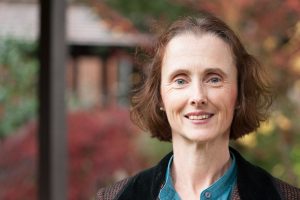
Speaking recently on International Women’s Day in her capacity as a female senior academic, Dr Catherine Tissot revealed her early inspiration and had some unusual advice for those embarking on a career in education, special needs and academia.
Catherine’s undergraduate degree in the USA focused on special needs teaching and that is certainly where she saw her future lying. She had no inkling then that she would become a teacher of teachers and ultimately the Head of one of the highest ranked schools of education in the United Kingdom.
Catherine’s childhood involvement in voluntary activities with kids in her local park confirmed to her from a very early age that her future lay in education.
She said: “I absolutely knew I wanted to become a teacher from earliest memory and I also became passionate about Special Needs teaching from a very young age.”
After High School (in the USA), Catherine enrolled at the renowned university for special education provision, Cardinal Stritch University in Milwaukee, Wisconsin. Drawn as always to special needs, Catherine found herself helping out with SN children’s swimming programmes at University in her spare time. She loved her voluntary work and saw her future being in the classroom as a special needs teacher.
Fate thought differently. Travelling to live in France in 1990, following her husband on a work posting, Catherine as quickly formed contacts with local SN groups and began volunteering. Their next posting took the couple to the UK, where she picked up her charity work again. The connections she made at the local University through this led to her being offered a scholarship to pursue a PhD.
Catherine said: “I was so delighted and excited at being offered this unexpected opportunity.”
Focusing her research on how appropriate provision can be determined for the vast array of individuals on the various spectrums of special needs, Catherine examined the perspectives of school, parents and Local Authorities.
Fully absorbed by now, having finished her PhD, Catherine started lecturing part-time at Brunel University. After a brief foray back into a special needs school, she finally arrived at the Institute of Education at the University of Reading in 2008.
As Head of School since 2015, Catherine envisages a world where teachers are given the support and time to attend appropriately to individual children’s differing needs.
She said: “Each special needs child is unique, so teachers need to have the opportunity to make plans that suit the child’s own pattern of learning and well-being. Often the first plan may not work, so you will need to revisit and there needs to be provision for this level of flexibility in the curriculum.”
Catherine sees the academic community getting closer to understanding the causes of autism, but warns that it will be a complex network of causes, rather than just one. She sounds a further warning note about the future of teaching in general in the UK:
“The point I’d like to make is that we are rapidly approaching significant shortages of teachers. This is partly because we are not able to recruit enough new teachers to replace retirees. Sadly, another cause is that teachers are not staying in the field because of the work load. This is a problem that needs addressing at policy level and any solution will come at a cost.
“Another area where I’d like to see change is in the public perceptions of teachers. Remember that what you see in the classroom is only the tip of the iceberg. I don’t know of any good teacher who doesn’t work evenings, weekends and holidays to stay on top of planning, marking and paperwork.
“I’d like to see parents more involved too, shouldering their own responsibility of raising children who are school-ready, in the most basic terms. I was talking with a Year 2 teacher last week who was frustrated because a child was not yet toilet-trained, for instance. How can a teacher achieve meaningful results when facing such basic obstacles?”
Catherine’s other concern is the effect of new technology on children’s communication.
“They become consumed by it, addicted to it, and this impedes communication skills, real world skills, writing skills; in fact all the indicators of a successful future. It’s very sad.”
Does Catherine have any words of advice for young people setting out on a career in education?
She cites seizing opportunities when they arise as the secret to achieving life goals – even those goals you didn’t realise you had to begin with.
She said: “I’m now Head of School. I wouldn’t have had that opportunity if hadn’t taken the chance the moment I was offered that scholarship. My confidence grew with the scholarship, and of course each stage of attainment gives you more confidence in yourself.
“I would say, be bold and take advantage of all the opportunities that come your way. Be sure to realise and recognise opportunities that may be right in front of you. And remain constantly reflective in your daily life. Take suggestions positively, seize opportunities and don’t be too risk averse.”
When she has time off from running the Institute of Education, Catherine absorbs herself in another kind of growth. Her allotment is her pride and joy and she describes the pleasure of growing all her family’s vegetables. Catherine also closely follows the fortunes of her favourite American football team, the Green Bay Packers and when she has a moment to spare, loves to swim with the group of lads who are her swimming buddies.
When asked whom she would point to as her career inspiration, she pauses for a moment.
“There are so many. I’ve been lucky in that I’ve been helped by informal mentors throughout career and my family has a tradition of strong women! My most recent inspiration though has been the IoE’s own Professor Rhona Stainthorp. She is so very good at challenging me in a supportive manner and she always has an open door and cup of tea ready!”







